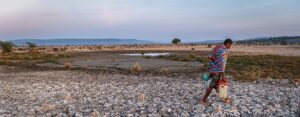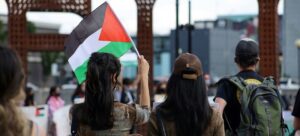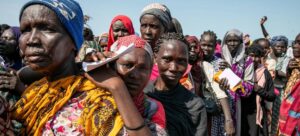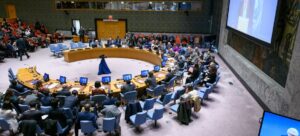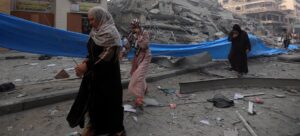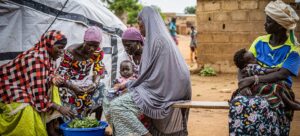Briefing top diplomats, the UN chief said the world must not look away from the suffering of civilians in Gaza, calling for “a true humanitarian ceasefire” that leads to a lasting two-State solution.
The meeting has now ended in New York, but the frantic diplomacy continues to try and end the devastation in Gaza caused by Israel’s offensive to destroy Hamas, return the remaining hostages held by Palestinian militants, and provide a secure future for both Israel and Palestine. Here are the highlights from Wednesday’s meeting:
HIGHLIGHTS
- “We need a true humanitarian ceasefire,” said UN Secretary-General António Guterres, describing a catastrophe on the ground in Gaza and underlining the need to release all hostages
- Tor Wennesland, UN Special Coordinator for the Middle East Peace Process, had “a message that resonates today as we mark the International Day of Solidarity with the Palestinian People: There must be a new and different approach, or we are doomed to return to the path of managing a conflict that clearly cannot be managed”
- Council members, including many ministers, roundly decried the unfolding humanitarian crisis and commended the ongoing pause in fighting, with some calling for the full implementation of its resolution 2712 on the crisis
- “We cannot afford to lose more lives,” said the ambassador of Malta, penholder of resolution 2712, adopted in mid-November following several failed attempts
- Non-Council members echoed those calls, with Qatar’s Prime Minister saying “it is high time to take real measures towards peace; the region will not enjoy peace and security without the establishment of a Palestinian State”
- Israel’s ambassador said the Council has not addressed Hamas’s “central role in the ruin of the region”
- “We are at a historic crossroad,” said the Minister of Foreign Affairs and Expatriates of the observer State of Palestine
- Read our explainer on international humanitarian law and other explainers here.
- For summaries of this and other UN meetings, visit our colleagues at the UN Meetings Coverage in English and French
1:15 PM
Indonesia: Aid window ‘too narrow and too fragile’
Retno Lestari Priansari Marsudi, Minister for Foreign Affairs of Indonesia, welcomed the adoption of Council resolution 2712, as well as the humanitarian pauses and release of hostages and prisoners.
“Out of this small glimpse of peace, we could see hope – families reunited and aid reaching those in desperate need,” she said, adding, however, that it is not sufficient.
“The humanitarian pause is too narrow and too fragile and will not be able to create a better situation in Gaza,” she cautioned.
Another day without fighting is a day worth fighting for
Calling on the Security Council to act to preserve trust in the multilateral system, she said it must ensure that hostility does not return with vengeance.
“Another day without fighting is a day worth fighting for,” she declared, adding that the warring parties must move beyond a humanitarian pause into a durable ceasefire.
Emphasizing the importance of the two-State solution, she said it is the right time to restart the peace process.
“As we honour this year’s International Day of Solidarity with the Palestinian People, let us not turn a blind eye or remain silent to the struggle of the innocent people in Gaza whose only sin is being born Palestinian.”
12:58 PM
End ‘flagrant injustice’ of Israeli occupation: Jordan
Ayman Safadi, Deputy Prime Minister and Minister for Foreign Affairs of Jordan, underscored that ending the Israeli occupation of Palestine is a viable way to ensure peace for Palestinians, Israelis and all others in the region.
“Those who purport to say that this conflict is a religious conflict are lying; they are trying to falsify history and reality,” he said, stressing that the conflict continues because of an “unfair occupation and flagrant injustice”.
He urged the Security Council to make a strong call for a ceasefire and to bring an end to the aggression.
“We demand the international community bring an end to the occupation, to bring an end to the conflict,” he said. “You all support the two-State solution,” which by definition would bring an end to the occupation.
“There is only one viable path to peace that we all want,” he continued, calling on the Security Council to adopt a resolution recognizing the Palestinian independent State, with Jerusalem as its capital along the pre-1967 borders.
12:48 PM
Türkiye: Swimming in ‘untrusted waters’
Hakan Fidan, Türkiye’s Minister for Foreign Affairs, warned against the paralysis of the Security Council, which has failed to rectify the historic injustice inflicted on the Palestinians for many decades.
We are all in untrusted waters
Without international laws, principles and moral, “we are all in untrusted waters,” he said, fearing more radicalization on all sides, fuelled by injustice and impunity.
Millions of people around the world are coming together to express their solidarity with the Palestinian people. The frustration and revolt sparked by the atrocities committed by Israel might lead to social upheaval in many countries, he cautioned, adding that the extension of the humanitarian pause in Gaza and the exchange of hostages and prisoners are, in his eyes, glimmers of hope.
At the same time, he said he was following “closely and with concern” the different scenarios for the “day after”.
Therefore, this dark episode must be translated into possibilities for resolving the conflict, otherwise, the symptoms may lead to a more catastrophic tomorrow, he said.
12:40 PM
Egypt: No more ‘empty statements’
Egypt’s Foreign Minister, Sameh Hassan Shoukry Selim, said that since day one, his delegation has been calling for the release of Israeli hostages.
But, what do the international community and the Security Council think of the fate of Palestinian prisoners “who are also ‘hostages’ held by the occupying Power?” he asked.
Egypt has presented an “apolitical” draft resolution on humanitarian aid, he said, calling on the Council to support it “to put an end to this catastrophe”.
“We must abandon double standards and translate compassionate words into action,” he said.
As for the next steps, the only possibility is to address the root causes of the conflict in an integrated and comprehensive manner to end the occupation.
“We must put aside ’empty statements’ and work hand in hand on the two-State solution,” he said, emphasizing that it is time for countries to recognize the State of Palestine as a full member of the United Nations.
12:30 PM
Qatar: Take ‘real measures’ to cement peace
Sheikh Mohammed bin Abdulrahman Al-Thani, Prime Minister and Minister for Foreign Affairs of Qatar, said Palestinians “have gone through hell” in the past weeks.
Sheikh Mohammed bin Abdulrahman Al-Thani, Prime Minister and Minister for Foreign Affairs of Qatar, addresses the UN Security Council meeting on the situation in the Middle East, including the Palestinian question.
For its part, Doha has started close communications with parties to put an end to the bloodshed and ensure the return of hostages. Recalling recent high-level negotiations in which Qatar has been central, he said an agreement had led to an extension of the pause and the release of hostages and Palestinian prisoners. It also paved the way to get more aid into Gaza.
Prime Minister Al-Thani said he looked forward to further action by the Security Council, including a monitoring mechanism to oversee aid distribution. Above all, international humanitarian law must be upheld, without double standards, he stated.
“It is high time to take real measures towards peace,” he said. “Any attempt to avoid straight forward actions will only lead to an escalation of violence. We call for peace. The region will not enjoy peace and security without the establishment of a Palestinian State.”
What does humanitarian law really mean?
Many top diplomats invoked the importance of international humanitarian law in the Council Chamber on Wednesday morning. UN News produced an explainer last month, outlining exactly what it is and how it was designed to provide guardrails in times of conflict.
12:15 PM
West showing ‘blatant double standards’ over Gaza: Russia
Russian Ambassador Vassily Nebenzia stated that for over two months, a conflict of biblical proportions has gripped the Middle East.
“It is no exaggeration to say that it has become one of the most lethal regional conflicts in recent decades,” he said, noting the devastating impact on civilians, in particular children.
Ambassador Vassily Nebenzia of Russia addresses the UN Security Council meeting on the situation in the Middle East, including the Palestinian question.
He also highlighted the efforts of all humanitarian workers on the ground, risking their lives to deliver vital aid, and paid tribute to those killed.
Mr. Nebenzia questioned the “blatant double standards” of Western delegations vis-à-vis the Palestinian people.
“How many times have Western delegations requested Security Council meetings on Ukraine? The answer is at least twice a month,” he said. “How many times have these delegations requested Security Council meetings on the Middle East? Zero.”
He asked “why are you being so timid, or is it that the fate of the Palestinian population is much less interesting for you from a domestic political perspective in your capitals?”
It is time to think about the day after, he said.
“There are many questions about the ways to rebuild Gaza and, in general, the future long-term solution to the Palestinian question,” he said. “Without a solution to that, it will not be possible to ensure a truly sustainable security situation for Israel. Russia is actively working in this direction.”
12:01 PM
France: Council must condemn Hamas attack
French Ambassador Nicolas de Rivière said the truce must become permanent through a lasting ceasefire, and all hostages must be released.
Condemning the Hamas attacks against Israel on 7 October, he said the Council must do the same unambiguously and without further delay.
Welcoming progress in getting aid into Gaza, he echoed other Council members’ calls for increased access. For its part, France has begun treating wounded Palestinians on its hospital ship and has sent tonnes of aid to Gaza, he told ministers.
Calling on Israel to halt settler violence in the Palestinian Occupied Territory, he worried that unless action is taken, the conflict could spill over throughout the region.
“To bring an end to the cycles of violence, there must be a relaunch of a credible peace process,” he said. “Further procrastination would undoubtedly result in an escalation of violence.”
A Palestinian State is the only viable way forward, he said.
Food is distributed to displaced people in Jabalia, northern Gaza.
11:46 AM
Avoid ‘regional conflagration’: Malta
“We cannot afford to lose more lives”, said Maltese Ambassador Vanessa Frazier, who led the successful Council resolution negotiations earlier this month.
“We cannot return to further bloodshed and insecurity; it is in this spirit that Malta echoes the Secretary-General’s call for an immediate humanitarian ceasefire,” she said.
Ambassador Vanessa Frazier of Malta addresses the UN Security Council meeting on the situation in the Middle East, including the Palestinian question.
She called on all parties to urge de-escalation and exercise the utmost restraint.
She reiterated Malta’s “strong condemnation” of the terror attacks by Hamas and called for the release of all hostages, immediately and unconditionally. But, countless children caught up in the conflict are continuing to live in “increased anguish and deprivation”.
She said the World Health Organization’s (WHO) statement that more now could die from disease than bombing in Gaza, was “gravely concerning, and immediate action is needed to prevent this scenario”.
“Avoiding a regional conflagration is of utmost importance and must be avoided at all costs,” she said. “It is imperative that we consider a credible foundation for future peace.”
Malta reaffirmed its commitment to a two-State solution along the pre-1967 borders, addressing the legitimate aspirations of both sides, with Jerusalem as the future capital of two nations, in line with the relevant Security Council resolutions and internationally agreed parameters.
Within this dire context, and particularly today on the International Day of Solidarity with the Palestinian People, she said it remains clear this is the only viable path to peace.
11:30 AM
Time for ‘unifying action’: Ghana
Mavis Nkansah-Boadu, Ghana Deputy Minister for Foreign Affairs and Regional Integration, said that events over the past few days “remind us all of the consequence of ‘elusive peace’” in the Middle East during the past 75 years.
Foreign Minister Mavis Nkansah-Boadu of Ghana addresses the UN Security Council meeting on the situation in the Middle East, including the Palestinian question.
“As we contemplate a Gaza after tomorrow, we cannot overlook the totality of peace required in Palestine, which demands of the parties their full commitment to seek the narrow and difficult path for a renewed and constructive dialogue on a political horizon,” she said.
Absent progress from the international Quartet on Middle East peace, she strongly encouraged the Security Council to consider appointing a special rapporteur from among its members to unify its position on how to further proceed with the two-State solution.
She said a positive response from donors was essential to keep funding UN aid agencies’ work on the ground and stressed the importance of the UN force (UNIFIL) working to keep the peace along the ‘blue line’ between Lebanon and Israel.
She emphasized the importance of protecting civilians as a key responsibility of the Council, saying that no effort should be spared to de-escalate the conflict and prevent its spread.
She renewed Ghana’s commitment to support efforts towards lasting peace “and unifying action by all of us”.
11:15 AM
UAE: Gaza aid must be increased ‘in sustained manner’
The current truce is “a sign of hope”, said Khalifa Shaheen, the United Arab Emirates’ Minister of State. He expressed his appreciation for the diplomatic efforts of Qatar, the US and Egypt in bringing about the pause.
He also stressed the importance of the Council’s resolution this month relating to international law and the release of detainees.
Underlining the relevance of the UN chief’s briefing on progress made regarding aid, he said it was vital to improve aid mechanisms “in a sustained manner and at sufficient scale”.
Recent events have demonstrated the need for the international community to stop merely managing this conflict, he said.
“Instead, we must work to revive hope for the possibility of reaching a just, lasting and comprehensive political solution to the Palestinian issue,” he said.
Moving forward, a suitable environment must be created for resuming serious negotiations, based on the agreed upon references to achieve a two-State solution, so that these steps begin to be implemented immediately after a ceasefire is reached.
He underscored that achieving sustainable peace will not be possible without ending the Israeli occupation of all Palestinian and Arab territories and establishing an independent Palestinian State, based on the borders of 4 June 1967, with East Jerusalem as its capital, living side by side with Israel in security, peace and mutual recognition.
10:52 AM
United States: Pause is ‘glimmer of hope’
US Ambassador Linda Thomas-Greenfield said the pause has provided a “glimmer of hope”.
“While the work we do in this Chamber is important, often times progress occurs outside these walls,” she said, adding that, from day one, the United States’ approach has been driven by direct diplomacy.
However, much more humanitarian assistance is needed as well as civilian protection, she said.
“We know Hamas continues to use people as human shields, but this does not lessen Israel’s responsibility to protect civilians under international humanitarian law,” she said.
Welcoming the release of some hostages, she said many families are “living in hell”, adding that “we will not rest” until all are freed. As such, the US wants to see the pause extended, she said, adding that “the ball is now in Hamas’s court.”
Ambassador Linda Thomas-Greenfield of the United States addresses the UN Security Council meeting on the situation in the Middle East, including the Palestinian question.
‘We need a two-State solution’
She expressed concern that the conflict may spill over, including in Lebanon, together with a rise of settler violence in the West Bank and a spike in dehumanizing rhetoric playing out in anti-Semitic and Islamophobic messages online.
“We need a two-State solution,” Ms. Thomas-Greenfield said, as this is the only way to end this cycle of violence once and for all.
“Let us work together. We must commit to diplomacy, and let us do everything possible at long last to deliver on the promise of peace and the hope for a brighter future.”
10:45 AM
Every civilian life lost, ‘a tragedy’: UK
Lord Tariq Ahmad, the United Kingdom’s Minister of State at the Foreign Office, said that as the world looks to the Middle East, “a tragedy is unfolding in front of our eyes.”
United Kingdom’s Minister for the Middle East, Lord Tariq Ahmad, addresses the Security Council meeting on the situation in the Middle East, including the Palestinian question.
“Israel has suffered the worst terror attack in its history, and Palestinians are experiencing a devastating and growing humanitarian crisis as a result of the ensuing Israeli military action,” he said.
He emphasized that every civilian life lost is a tragedy.
“Every life matters – Israeli or Palestinian. Every innocent civilian life lost – Palestinian or Israeli – is a tragedy. Indeed we also collectively mourn the loss of all innocent lives, including those of UN personnel delivering vital lifesaving aid in Gaza,” he said.
He noted that the past week of military pause had provided a much needed respite, with the agreement being an important opportunity in giving hope to the families of the hostages and for allowing vital humanitarian aid into Gaza.
“But, this should not be a one-off; we must collectively build from it,” he urged. “Hostages must be released, aid must get in and civilians must be protected.”
10:35 AM
China: Dialogue is best way to save lives
Wang Yi, Foreign Minister of China, which holds the Council presidency for November, said in his national capacity that the way out of crisis and conflict is through the two-State solution.
Foreign Minister Wang Yi (center) of China, addresses the Security Council meeting on the situation in the Middle East, including the Palestinian question.
“Dialogue and negotiation is the best way to save lives,” he said, adding that at this crossroads of war and peace, the international community must work towards finding solutions.
“Resumed fighting will most likely turn into a calamity that encompasses the whole region,” he said, expressing hope that the pause will be the beginning of a negotiated ceasefire.
Civilians must be protected with more robust actions, and the UN must play a greater role in humanitarian efforts in Gaza, he said, announcing that China will provide another package of aid.
Two-State solution remains path to peace
Only the implementation of the two-State solution can restore peace, he said, calling for bolstered diplomatic efforts in this regard, including restarting direct Israel-Palestine negotiations.
The Security Council should shoulder its responsibility and heed the calls to take further action promptly, he said, adding that China has submitted a paper on resolving the conflict.
Humanitarian aid is delivered to UNRWA shelters in the northern Gaza Strip.
10:20 AM
Israel: ‘Shocking’ Council failure to condemn Hamas
Gilad Erdan, Permanent Representative of Israel to the UN, said that Jewish people have experienced genocidal attempts and attacks more than once, “from Hitler and the Mufti and the terror organizations that follow in their footsteps”.
Ambassador Gilad Erdan of Israel addresses the UN Security Council meeting on the situation in the Middle East, including the Palestinian question.
He noted that on 7 October, Hamas unleashed “an unprovoked act of pure evil upon evil upon Israel”, massacring the most Jews in one day since the Holocaust.
“Yet, shockingly, here we are two months later, and Hamas’s savage crimes have still not been condemned by this body [the Security Council] or any other UN body,” he said.
‘Elephant in the room’
Mr. Erdan went on to state that Iran armed, funded and trained Hamas, adding that its “central role in the ruin of the region has not even been addressed here”.
“It is not as if Hamas is fighting Israel alone. Hezbollah missiles have been raining down on northern Israeli towns. and Iran doesn’t hide its aim of Israel’s destruction,” he said, asking whether Iran’s central role in destabilizing the security of the Middle East does not deserve to even be raised in the Council.
“It is clear that the UN has been co-opted by those that have no real interest in a solution,” he said. “Every UN body has been weaponized against Israel.”
10:08 AM
Palestine: ‘We are at a historic crossroad’
Riyad Al-Maliki, Minister of Foreign Affairs and Expatriates of the observer State of Palestine, said a truce must become a ceasefire.
“This is not a war,” he said. “This is a carnage that no one can justify. It must be brought to an end.”
People must be allowed to go back to their homes, Mr. Al-Maliki added.
Riad Malki, Minister for Foreign Affairs of the State of Palestine, speaks at the Security Council open debate on the situation in the Middle East, including the Palestinian question.
“Over 15,000 Palestinians have been killed by Israel,” he said. “Over 10,000 of them are women and children. They have been killed by Israel. They did not lose their life; it was taken away. No one is safe in Gaza, not the children, not the doctors, not the humanitarian personnel, not the journalists, not the UN staff. They were killed at an unprecedented pace in modern history.”
‘We need international protection’
“We are at a historic crossroad,” he said.
The protection of Palestinians cannot be ensured by the occupying forces who are complicit in these crimes, he said.
“We need international protection and international action to end impunity so as to prevent the recurrence of these crimes that occur daily and in broad daylight,” he said. “What our people are enduring now is the result of the international community’s failure to provide such protection and accountability.”
There is no Palestine without Gaza. Gaza bleeds, Gaza suffers, Gaza aches, but Gaza lives
These actions have consequences far beyond the borders of Gaza.
‘Palestine lives’
He said Israel is trying to intimidate those criticizing it and defending the rule of international law across the globe, including governments that consider themselves allies of Israel, the Secretary-General and UN agencies, human rights and humanitarian organizations. Israel is not seeking security.
“If it was, it would choose peace,” he said, adding that Israel, and this Israeli government more than any other, considers that the strategic threat it is confronted with is Palestinian statehood.
“Gaza has a very special place in our national history,” he said. “Its name today is how many people spell Palestine around the world. It cannot be erased. Our people cannot be uprooted from it. Its Palestinianness cannot be altered. There is no Palestine without Gaza. Gaza bleeds, Gaza suffers, Gaza aches, but Gaza lives. And Palestine lives. Free Palestine. That is the only path to peace.”
10:02 AM
Warnings went unheeded: Wennesland
Tor Wennesland, UN Special Coordinator for the Middle East Peace Process, told the Security Council that amid the surging violence and extensive Israeli movement restriction, the Palestinian Authority’s longstanding fiscal crisis has worsened significantly.
The economic activity in the West Bank has ground to a halt, and the economy of Gaza has collapsed, he said.
Tor Wennesland,UN Special Coordinator for the Middle East Peace Process, addresses the Security Council.
The decrease in revenue for the Palestinian Authority is impacting many critical services and the payment of public sector salaries, including to the security forces, he stated, warning “the situation is “boiling and getting worse rapidly”.
“In the months before the war, I warned this Council regularly that more must be done to help stabilize the situation in the West Bank,” Mr. Wennesland said. “That is more the case now than ever before.”
He went on to note that while much is unknown about how this war will end, some absolutes are clear.
“Acts of terror like those Hamas and others committed against Israel on 7 October must not be allowed to happen again, and Palestinians in Gaza in must never ever again experience the horrors they have endured,” he said.
Mr. Wennesland emphasized that the only viable path is one that leads to the end of the occupation and the realization of a two-State solution, in line with UN resolutions, previous agreements and international law.
“Our past efforts have certainly not been enough, a message that resonates today as we mark the International Day of Solidarity with the Palestinian People,” he said. “There must be a new and different approach, or we are doomed to return to the path of managing a conflict that clearly cannot be managed.”
09:50 AM
Guterres: Don’t look away from ‘epic humanitarian catastrophe in Gaza’
Welcoming the arrangement reached by Israel and Hamas, with the assistance of the governments of Qatar, Egypt and the United States, Mr. Guterres said the UN was working to maximize the positive potential of the current pause in fighting on the humanitarian situation in Gaza.
“The pause has enabled us to enhance the delivery of aid into and across Gaza,” he said, noting that for the first time since 7 October, an inter-agency convoy delivered food, water, medical supplies and other essential items to northern Gaza, specifically to four shelters in Jabalia camp operated by the UN agency to assist Palestine refugees (UNWRA).
Aid simply ‘inadequate’
But, the level of aid remains completely inadequate to meet the huge needs of more than two million people, he said.
At the same time, he stressed that all hostages must be released.
The arrangement announced on 22 November has so far led to the release, over five days, of 60 hostages – 29 women, 31 children – held by Hamas and other groups since 7 October, he said, adding that in addition, another 21 hostages were released during the same period. The arrangement also saw the release of 180 Palestinian prisoners and detainees from Israeli jails, mostly women and children.
“This is a welcome start, but as I have been saying from day one, all hostages must be released immediately and unconditionally,” he said.
The Security Council resolution calls on all parties to refrain from depriving the civilian population in the Gaza Strip of basic services and humanitarian assistance indispensable to their survival, consistent with international humanitarian law, he said “much, much more is required to begin to address human needs in Gaza.”
Success will be measured in lives that are saved, suffering that is ended, and hope and dignity that is restored
That includes full restoration of water and electricity services and urgently addressing the collapse of food systems and deteriorating public health.
The Rafah border crossing does not have enough capacity, especially considering the slow pace of procedures, to meet these and other needs, he said, urging the opening of other crossings, including Kerem Shalom, and the streamlining of inspection mechanisms to allow for the necessary increase of lifesaving aid.
‘True humanitarian ceasefire’ needed
However, humanitarian aid alone will not be sufficient, he said, adding that the private sector is needed to bring in critical basic commodities to replenish completely depleted shops.
The UN chief also highlighted the “numerous accounts of sexual violence during the abhorrent acts of terror by Hamas” on 7 October, which triggered the current crisis.
He called for them all to be “vigorously investigated and prosecuted…Gender-based violence must be condemned. Anytime. Anywhere.”
“Success will be measured in lives that are saved, suffering that is ended and hope and dignity that is restored,” he said.
“The people of Gaza are in the midst of an epic humanitarian catastrophe before the eyes of the world,” he said. “We must not look away.”
He welcomed the ongoing intense negotiations to prolong the truce.
“But, we believe we need a true humanitarian ceasefire, and we must ensure the people of the region finally have a horizon of hope by moving in a determined and irreversible way toward establishing a two-State solution, on the basis of United Nations resolutions and international law, with Israel and Palestine living side-by-side in peace and security,” he said. “Failure will condemn Palestinians, Israelis, the region and the world to a never-ending cycle of death and destruction.”
09:43 AM
Secretary-General António Guterres is in the Security Council Chamber primarily to report back on the latest dire humanitarian situation, according to the resolution the 15-member organ adopted in mid-November.
He told ambassadors and ministers that more than two thirds of those killed in Gaza so far have been children and women.
In a matter of weeks, a far greater number of children have been killed by Israel than in any year by any party to a conflict since he has been Secretary-General, the UN chief said.
UN Secretary-General António Guterres addresses the Security Council Meeting on the Middle East.
Over the past days, there has been a “glimmer of hope and humanity” for both hostages and their families, and civilians in Gaza amid the ceasefire, he said.
Before the current ceasefire, “we witnessed serious violations of international law in Gaza”, he said, with 80 per cent of Gazans now forced from their homes.
He also said rocket attacks on Israel have continued by Palestinian militants along with the use of civilians as human shields.
“This is also inconsistent with international humanitarian law obligations,” the UN chief said.
09:36 AM
The meeting has just been called to order by the Chinese foreign minister. A host of foreign ministers from the region and beyond are being invited to speak in addition to Council members, together with Palestine and Israel.
Wednesday marks the sixth and final day of a truce between Hamas and Israel that was facilitated by Qatar. Humanitarians have urged the warring sides to support repeated international calls to extend the pause in fighting, which has facilitated the reported release of at least 85 hostages by Hamas and of more than 180 Palestinian prisoners by Israel.
China holds the presidency until the end of November, and the meeting around the horseshoe table will take place at a ministerial level, with Foreign Minister Wang Yi due to be in the chair and many other top diplomats from world capitals in attendance.
The meeting is due to start at 9:30am local time.
Secretary-General António Guterres is expected to report back on the implementation of that 15 November resolution – the first expression of unity on the Council over the crisis since the Hamas terror attacks and subsequent Israeli offensive – along with Special Coordinator for the Middle East Peace Process, Tor Wennesland.
Here’s are highlights from that mid-November meeting, which you can watch in full here, or catch up with UN Meetings Coverage summaries in English and French:
HIGHLIGHTS FROM 15 NOVEMBER
- The UN Security Council succeeds in finding unity, adopting resolution 2712 on the Israel-Palestine crisis that began on 7 October, with 12 members voting in favour, none against and three abstentions (Russia, United Kingdom, United States), calling for “urgent and extended humanitarian pauses and corridors” in Gaza for “a sufficient number of days” to allow full, rapid, safe and unhindered access for UN agencies and partners
- The Council “calls for the immediate and unconditional release of all hostages held by Hamas and other groups, especially children, as well as ensuring immediate humanitarian access”, by the terms of the resolution
- The Council, by additional provisions in the text, calls on all parties to refrain from depriving the civilian population in Gaza of basic services and aid indispensable to their survival, consistent with international humanitarian law
- The resolution does not condemn the Hamas attacks of 7 October which began the current wave of violence and battle for control of Gaza
- The Council rejected an amendment proposed by Russia, with five votes in favour, one against and nine abstentions
- “Our vote today translates into real human lives,” said the ambassador of Malta, penholder of the newly adopted resolution
- Ambassadors from the UK and US separately regretted to note that the draft failed to condemn Hamas and voiced support for civilian protection and rapid aid delivery measures
- Russia’s ambassador said a real ceasefire is needed and “the Council will need to make a decision on further steps”, including what observers to send to the conflict area and which UN contingent will be involved
- “This madness must be brought to an end,” said Palestine’s Permanent Observer to the UN, adding that: “It is time for peace”
- Israel’s Ambassador said the crisis could be brought to an immediate end if all Israeli hostages are returned unscathed and Hamas laid down their arms and turned themselves in


